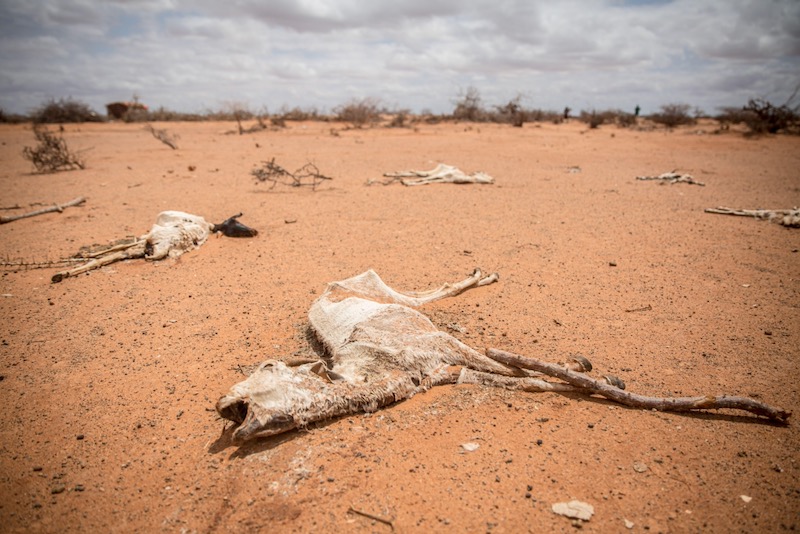As the conflict continues in Ukraine, rightly, the world’s attention is focused on the horrific humanitarian situation there. But the fallout from this conflict threatens the lives of many more people across the world, through its impact on the global food system.
Russia and Ukraine are major exporters of key staple crops, including wheat, barley and sunflower oil, and the conflict has led to huge price increases of these commodities. On top of that, Russia is a major exporter of fertiliser, and market disruption has increased prices. Because much agricultural production relies on inputs of synthetic fertiliser and pesticides, food prices are directly affected.
But even before the war started, the food system was in crisis. Farmers around the world have been badly hit by the impacts of the Covid-19 pandemic and climate change. In the Horn of Africa, agricultural production has been affected by low rainfall over four seasons, resulting in the loss of livestock and severely reduced crop yields. These crises over the last few years have revealed the fragility of the global food system, with failed harvests and broken supply chains leaving many millions of people facing hunger.
In 2020, up to 800 million people experienced hunger. Now, as a result of the Ukraine crisis, the UN’s Food and Agriculture Organisation is reporting food prices at an all-time high, with prices in March 2022 more than 30 per cent higher than March 2021.
And as with all crises, the most vulnerable will be hit hardest.
Low-income countries in the Middle East, the Horn of Africa and West Africa rely on wheat imports from Russia and Ukraine to feed their populations, making them especially vulnerable to price increases on global markets. Even though there is enough food to feed everyone, price increases and supply chain disruption has left these countries struggling to afford fertiliser for their farmers, or grain for their populations.
The Ukraine crisis demonstrates, once again, that national and global food systems are not resilient. It has thrown into sharp relief the need for transformational change to reduce the fragility of food security in many low-income countries, and their vulnerability to market shocks and volatility.
Just as the Ukraine crisis has shown the vulnerability of our energy systems, it lays bare similar weaknesses in our food system. And, as with our energy systems, the only way to fix this crisis is drastically to reduce our reliance on fossil fuels and a small number of exporters. We need to build diversity in our production systems to build resilience.
We know it is possible to build resilient food systems, even – or especially – in a time of crisis. In Brazil, Cafod partners, the Land Pastoral Commission of João Pessoa (CPT-JP) responded to the Covid-19 pandemic by working with smallholder farmers’ associations, which won humanitarian contracts to deliver fresh, organic emergency food to people struggling, having lost their jobs in lockdown.
At the same time, their agro-ecological production methods helped to restore soils and biodiversity, and boost resilience to climate change. Family farmers were able to sell their produce even though markets were closed, and poor urban households had access to food. Together they created short food supply chains connecting rural communities to their urban neighbours, reducing hunger, and supporting smallholder farmers’ incomes. This localised action shows communities leading the way in tackling the problem, and we urgently need to scale up such responses, to create a wholesale shift in our globalised food system.
We need to respond to the immediate humanitarian crisis in Ukraine and beyond. But we need to do so in ways that support long-term transformation so that the food system is more sustainable and resilient to future shocks.
In the short term, beyond doing everything possible to end the conflict in Ukraine, we need to act to prevent hunger and malnutrition in the Horn of Africa and elsewhere by stabilising global food prices and providing safety nets for those most at risk. This requires global cooperation through UN bodies like the Committee on World Food Security.
But short-term responses must align with longer-term actions needed to reform the food system, address food insecurity, and build local economies that are better able to withstand future shocks.
We need to transform the food system away from being dependent on fertilisers and pesticides, long-supply chains, and global trade in a few staple crops.
We urgently need more investment in sustainable, climate-resilient, agricultural production in low-income countries, to ensure they are less vulnerable to market volatility and can grow more of the food they need themselves, where people need it.
We also must address long-term structural problems in global food markets that exacerbate the unequal distribution of global food supplies.
Humanitarian support is vital in the immediate term both for people in Ukraine and for people facing famine in the Horn of Africa, but we must prioritise strengthening agriculture in local communities to allow them to break free of this dysfunctional system.
This is a matter of justice, placing the resources to end hunger directly back into the hands of those who need them. To not do so would spell disaster for all those within the food system, in its entirety.
Ruth Segal is the Lead Analyst for Food Systems at CAFOD.



 Loading ...
Loading ...
What do you think?
You can post as a subscriber user ...
User comments (0)